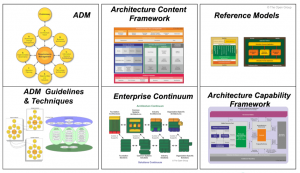TOGAF
The Open Group Architecture Framework (TOGAF) is a framework for Enterprise Architecture (EA) that provides an approach for designing, planning, implementing, and governing an enterprise information technology architecture
- See also TOGAF
- An Architectural Development Method (ADM)
- ADM Guidelines and Techniques
- Architecture Content Framework
- Reference Models
- Enterprise Continuum
- Architecture Capability Framework
TOGAF Pillars:
There are four architectural domains in TOGAF that offer specializations for businesses.
| Business Architecture | includes information on business strategy, governance, organization and how to adapt any existing processes within the organization. |
|---|---|
| Applications Architecture | a blueprint for structuring and deploying application systems and in accordance with business goals, other organizational frameworks and all core business processes. |
| Data Architecture | defining the organization’s data storage, management and maintenance, including logical and physical data models. |
| Technical Architecture | also called technology architecture; it describes all necessary hardware, software and IT infrastructure involved in developing and deploying business applications. |
TOGAF
TOGAF (The Open Group Architecture Framework) is a comprehensive framework for enterprise architecture that provides an approach for designing, planning, implementing, and governing an enterprise information architecture. It is widely used by organizations to improve business efficiency and achieve strategic goals.
TOGAF is a framework - a detailed method and a set of supporting tools - for developing an enterprise architecture. It may be used freely by any organization wishing to develop an enterprise architecture for use within that organization.
Source: TOGAF Standard v9.2
- Snippet from Wikipedia: The Open Group Architecture Framework
The Open Group Architecture Framework (TOGAF) is the most used framework for enterprise architecture as of 2020 that provides an approach for designing, planning, implementing, and governing an enterprise information technology architecture. TOGAF is a high-level approach to design. It is typically modeled at four levels: Business, Application, Data, and Technology. It relies heavily on modularization, standardization, and already existing, proven technologies and products.
TOGAF began to be developed in 1995 by The Open Group, based on the United States Department of Defense's TAFIM and Capgemini's Integrated Architecture Framework (IAF). As of 2016, The Open Group claims that TOGAF is employed by 80% of Global 50 companies and 60% of Fortune 500 companies.
